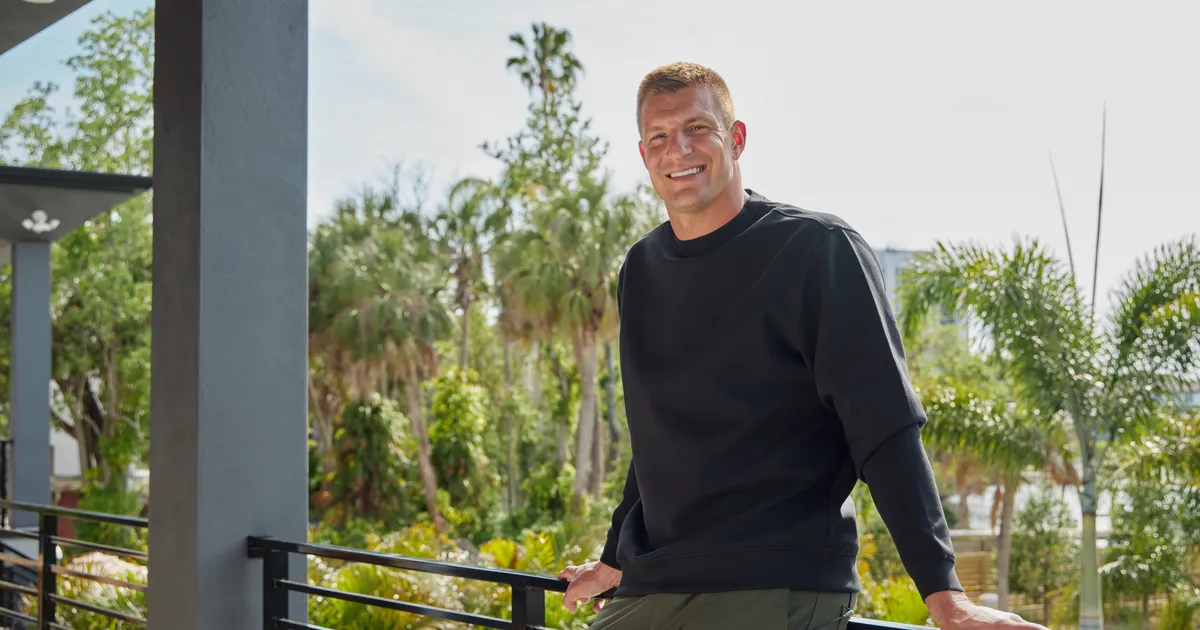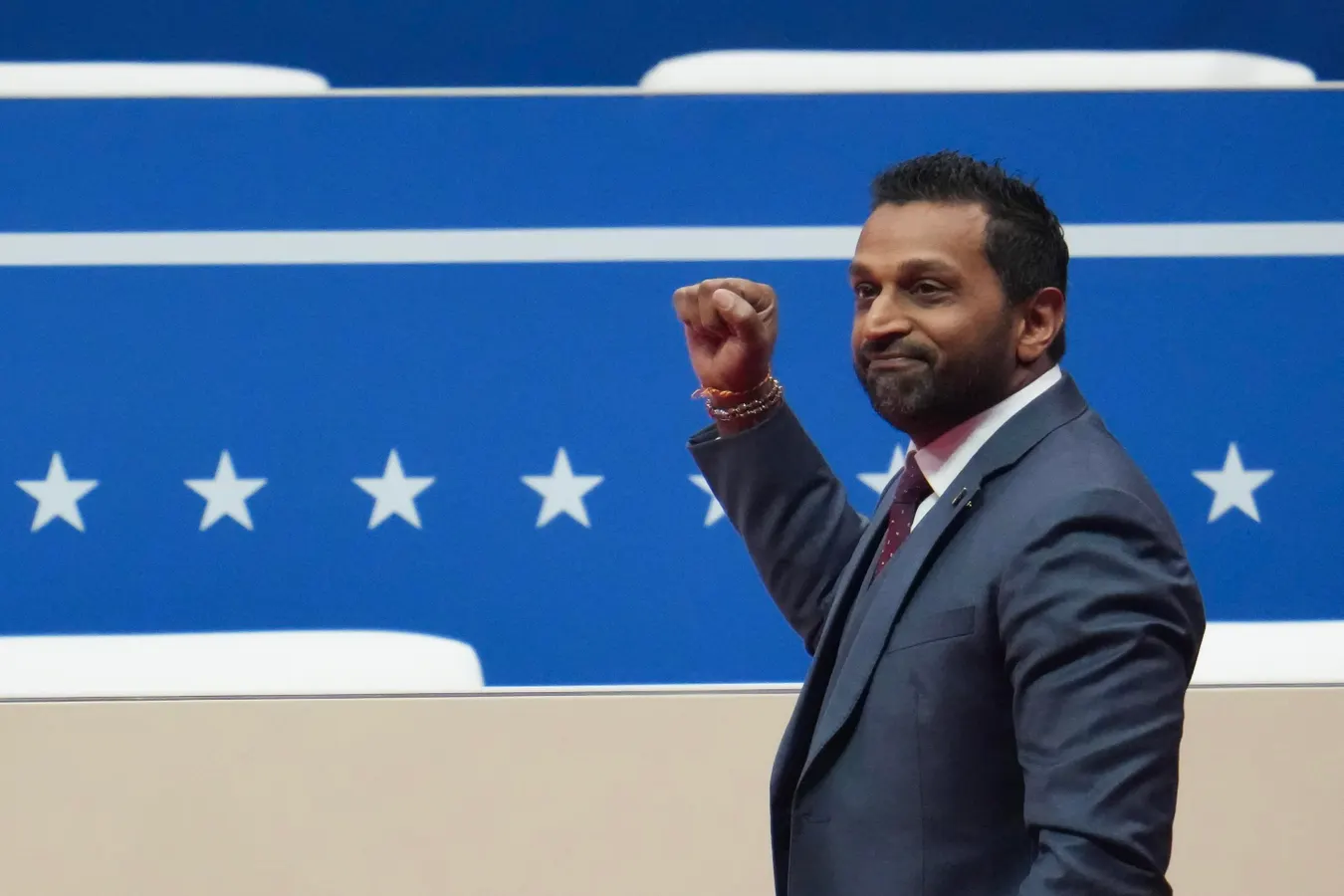
15 years ago, Rob Gronkowski arrived in the NFL seemingly straight out of central casting — almost the platonic ideal of a football player in the American psyche. He was all muscle and kinetic energy, a fearsome blocker and incredible receiver who was impossible to tackle, a selfless teammate on the field and the ultimate party animal off it. His touchdown celebrations — often a silly dance followed by a ferocious spiking of the football — summed up his spirit as well as anything. Having fun was his goal in life, and he seemed to be better at this, too, than anyone else.
Gronkowski grew up in Buffalo, New York as the fourth of five brothers, raised by a stay-at-home mother and a father who sold high-end fitness equipment. After being drafted in the second round following a career-threatening back injury in college, Gronk won four Super Bowls in 11 seasons: nine with the New England Patriots, and two more with the Tampa Bay Buccaneers, after un-retiring to reunite with Tom Brady (who threw more career touchdowns to Gronkowski than to any other receiver). He retired again in 2022 as one of the best tight ends in history.
Perhaps the most fascinating thing about Gronk is that there has always been a method to that madness. He inherently understood and calculated the relationship between hard work and hard partying, and went full tilt at both. “I did the stupidest shit in the smartest way possible,” he explained elsewhere recently. Gronkowski lived solely off of his endorsement money during his playing career, and remains one of the most marketable athletes around, even in retirement. He’s currently a studio analyst for NFL on Fox, and, earlier this summer, celebrated the opening of — what else? — a playground named and designed in his honor, in Boston. Gronkowski spoke with me recently about his rambunctious childhood , life after partying, the need to re-create locker-room vibes in retirement, and much more.
Congratulations on Gronk Playground opening in Boston over the summer. You’ve worked a lot over the years to benefit kids. It’s easy to say “Rob’s a big kid at heart,” but I’m genuinely curious what you like about helping out the youth.
It starts with my own childhood, man. I had the best childhood growing up in Buffalo because I had three older brothers and one younger brother. We grew up on a street, Londonderry Lane, where there were literally 15 other kids between my age and my brothers’ age that we could hang out with, that we could call, that we could compete with, who were always available to play backyard sports. I had every opportunity to succeed in life. My brothers showed me the right path. I was competing versus older kids the whole time, which made me who I am mentally and physically: We were playing backyard tackle football, mini sticks in the basement, full checking.
That’s why I love giving back to the kids. Also, like you said, I’m a big kid at heart. I relate to kids, they relate to me. I started Gronk Nation Youth Foundation so I can give kids that are less fortunate the opportunity that I had growing up where I could go to a park, I had friends to play with, and I could compete at all times. That’s why this playground was so special for me to open up. And on top of that, to give back to the city of Boston as well, after how much support they gave me through my time playing here.
With your brothers, the constant activity, and all the fitness equipment from your father’s business, your childhood home sounds like a never-ending football practice. In your autobiography, you wrote that you enjoyed getting punched, and it would make you laugh. I suspect a lot of people wouldn’t like that at all. What do you think made you like physical contact so much?
It was just in my blood, and in my nature growing up. With three older brothers, and me being the troublemaker, they were always pounding on me. They were giving me charley horses nonstop. I feel like that’s why I didn’t really feel the pain going into the NFL, and I could get tackled without being brought down — because I was already taking punches from kids that were older than me since I was a child. I just always liked that contact. I was always dreaming as a kid to hurry up and get to the checking leagues in hockey where you could basically fight, and the second my friends and I were at that level, we were trying to check everyone possible. The neighborhood we grew up in, the other kids loved the physical nature too. They loved bringing it to the table.
I think a lot of parents and society these days would be shocked at that amount of physical activity.
Yeah, my parents would just let us go. They had two rules: No punching in the gonads and no hitting in the face. So if they knew that we knew the rules and we followed them, they would just let us go and just let us use all of our energy and toughen each other up. And if you’re not hitting in the face or the gonads, as a kid you can basically sustain any type of blow. So then we would just let it all out while playing mini sticks in the basement or backyard football or shooting hoops or whatever it was.
It sounds like another reason behind that was the idea that playing in the house keeps you out of trouble outside the house.
Yes. My mom loved us being at our own home because she could keep an eye on us and make sure we were hanging out with the right kids. She didn’t like us leaving the house and going to another house, because she didn’t know the rules there. She didn’t know if we were sneaking away from that house and hanging out with other kids she didn’t know. She let us play hard because she knew that was our nature, but she was always an excellent mom, making sure we weren’t around kids that were getting in real trouble. Our trouble was just not listening.
Was there ever a particular moment when you understood that people responded to “Gronk” and you realized, oh, this is really something?
I remember talking to my uncle a couple years ago. He literally said, “Rob, there were bets at our family parties. You were either going to jail or you were making it big. There was nothing in between.” So that aura was already there. I was always making people laugh at family parties. I was making my brothers laugh. I was always making my friends laugh, and I was always the class clown.
Did you ever think about why you had that effect on people?
I don’t know, man. I’ve just been doing my thing just since I was young, and just being myself, basically doing what I’ve been doing my whole life. It’s a good thing I was blessed to have the athleticism I had. That’s what made the charisma stand out, and why I was able to get away with what I was getting away with, because I was the star athlete since second grade. It wasn’t like I was forcing anything at all. It’s how I’ve been through college and into the NFL — just doing my own thing, and it catches on.
I understand you don’t party as much as you used to. You’ve always seemed to understand the connection between working and partying — that there’s a duality to it, that training hard allows you to party hard and vice versa. Are you partying less, then, because you no longer have the intensity of the NFL in your life?
It’s just getting older, man. It’s feeling it more. If I could feel like I was 22 years old again and go out all night and be able to wake up in three hours and get a full workout in, I would do that, but there’s absolutely no chance that I would be able to. It’s just growing up. Everyone grows up at some point.
And it’s not for the worse. Life changes. I truly thought when I was 21 years old that I’d be going out till 5 a.m. my entire life, but as you get older, you’ve got to take care of yourself, get sleep, all that good stuff. Going out was bliss when I was in my 20s, and then getting into my thirties, it’s just not really what interests me as much. Yes, I love to have a good time. I love to work hard, but all that toxic alcohol in your body … I like to have a drink with my friends, socialize and all that. But it’s just too big of a pounding on the body, and I like to feel good.
A lot of your marketability has been based around that image. Do you worry that partying less hinders that?
No, no, not at all. I feel like I’m more responsible now, so I feel like that increases the opportunities even more. Brands like that. They’re like, oh, okay, he’s not just a maniac running in the street. Because at first, brands walked away from me. I talked to some of my guys that brought me deals and they’re like, “Yeah, this brand never signed you because they thought you were an absolute maniac.” And now they love it. They see I’m responsible.
And I do like to have fun still. I try to bring the energy as much as possible to a shoot representing the brand, representing the company. I still like to go out, have a good time. I’m a responsible partier now, we can say.
But in some ways you were always an unusually responsible, or at least mindful, partier. When you were out at night, were you thinking in the back of your head about all the work you had to do the next day? Or were you truly living in the moment? It’s amazing you were able to balance the two.
Yeah, it was, and that’s why I also had to slow down, because I couldn’t balance any more, and I felt it at one point. I was like, “All right, I got to slow down. I need sleep. I can’t be doing that.” But how I felt like I balanced it, and how I said I did the stupidest shit the smartest way possible, is at the end of the night, I would pound water with electrolytes to try to balance it out. And no — it doesn’t completely balance it out at the time, but it’s like I start the process right away.
But really, one thing that kept me right was just moving the whole time while partying. We were dancing and I was activating all my muscles and sweating all over the place, so I still truly believe to this day that’s what kept me going, because movement is medicine. And moving for three hours straight literally got my cardio in, and so I was able to defeat everything, all the negatives to what I was doing.
There’s probably also a mental aspect of it: having fun and enjoying yourself.
Yes, exactly, that too, mentally just letting loose. And also, when I did let loose, it would give me that motivation to clean it up right away. It wasn’t like I would keep it going and be like, “Oh, crap, I got practice coming up.” So I would clean it up and I’d be like, “Wow, I just had a good time. I just let loose. Now it’s time to really focus.” And I’d get motivated from that, and then it would turn my focus to another level, and then it’d be like I rewarded myself, and now I can’t do it again unless I put the work in and then I can reward myself again.
Were you always able to lock in when you needed to?
Yes, always. I never really let the outside get in the way. I enjoyed it and I went hard at it, but when it was time to work, I didn’t let play get in the way ever. I kind of always knew that and understood it ever since I was a kid. That’s why I was able to get away with everything — because I would show up every single time when needed.
You didn’t spend any of your playing salary and lived off endorsements, yet so many retired athletes go on to declare bankruptcy. What made you so careful about money?
I grew up in a frugal household, and everything I had was hand-me-downs from my brothers besides underwear and socks, thankfully. But I probably was wearing their underwear and socks, to tell you the truth, without even knowing. My parents probably restocked my older brother’s underwear and socks and gave them to me for Christmas. But yeah, everything I had sports-wise was a hand-me-down. Skates, baseball mitts … that used baseball mitt was a brand-new one to me. It wasn’t about having material things at all as a kid. It was just having the opportunity and the people to play with and compete — that was my entire childhood. We never cared who had what. We would build our own bikes with bikes that were in the trash.
When I got to the NFL, my agent forwarded a bonus that I had to pay back in marketing money for the first $50,000 I made. So I bought a car and paid all my rent with that. For the first couple years I had a condo, split the rent with a roommate and would eat all the free meals at the stadium, so everything just worked out, man. I wasn’t living large at all my first couple years.
Do you still avoid large purchases?
No. I worked my butt off to get to where I am now, and I’m comfortable.
You were famous for playing as hard as anyone, ever, and you’ve felt it all. Of all the sensations in the game, is spiking a football one of the best?
In high school and in college I always wanted to spike the football, but it was always a 15-yard penalty, so I never did it, because it just wasn’t worth it. When I got to the NFL I was like, “Wow, this is another dream. I get to spike the football. It’s not a penalty.” It was something I always wanted to do as part of my celebration. So, it does feel great because you just scored a touchdown and you feel badass just taking that football and drilling it into the ground.
You’ve spent your life around the game and now you analyze the game on Fox and talk about it on your podcast. In your opinion, why is football so much more popular in America than anything else? What’s special about it?
That’s a great question. Everyone marveled over gladiators back in the day because of how much physicality there was and killing there was to it — and the closest thing to it now is the game of football. We’re the modern-day gladiators. It’s vicious. People love contact. People love action and physicality. It’s a team game as well. It takes 11 guys to come together on the field and come up with a strategy every single play.
And on top of that, every game matters. It’s not like there’s 80 games in the season, so you can’t slack. Then it’s do or die in the playoffs, and if you lose, you’re out. And anyone can win on any given Sunday.
Football is also complex. What do most people either not understand or not recognize about the game, especially at the NFL level?
I would say just how vicious it really is, how much you’ve got to take care of yourself, especially once you get to 25, 26 years old. If you really want to play a long career, you’ve got to learn the ins and outs on how to take care of your body, because one hit can derail you big-time, and then you start compensating. People truly don’t understand what it’s like Monday through Friday to get back to normal so you’re ready to go on Sunday.
What does that involve?
It involves getting treatment, going in the training room, getting massages, going in the hot tub, saunas, cold tubs, getting your body right. It’s about doing the proper workout to activate all your muscles again. Also rest, proper rest.
For someone who grew up with all that physical contact, how bad are NFL-level injuries on the pain scale?
It depends what type of injury you got. Injuries go from all over the place, from a bruise all the way to something broken or a ligament tearing. The one that hurts the most is when one of your bones gets hit. Not even breaking a bone or tearing something, it’s like when a helmet or a cleat comes flying in and it hits a bone? Oh, it hurts! You think you broke your whole body when that happens.
Is there anything you’ve learned in retirement that you wish you knew when you were younger?
When I was younger, the only goal in my life was to make it to the NFL. I never thought about post-NFL at all. I just thought it’s what I’m going to do my whole entire life. But I’ve learned a lot through the NFL that helps out my post-career as well. And also making it to the NFL has established a lot of opportunities for me as well after I got done playing.
What did you learn?
To stay active, no doubt about that. You don’t have to go as hard as you were when you were playing, but to go on walks, work out. Also having that locker room: what you miss a lot, big time, is just being around the guys all the time. So I always try to have a workout group with friends, with ex-teammates, because it has that locker room feeling. That’s where a lot of players struggle, even me, is just not being around the guys and having conversation and laughing and working all at the same time.
I’m lucky to have that with the Fox family I’ve got. Working at Fox is like being in the locker room with those guys. Another big thing that a lot of players miss is being on a schedule your whole life. You got to be there, you got to be at this meeting. So you have to set your life up after football to where you’ve got things to do, you’ve got to be somewhere, and you’ve got to work hard at it. Because working hard and having an end goal and reaching that end goal is what it’s all about, whatever it is.
Pro athletes spend their whole career being in tune with their bodies, compared to the couch-potato lifestyle of a lot of regular people. Is it tough in retirement for an athlete to not use your body as much?
Yeah, definitely, and that’s why I like to work out and rehab all the injuries that I’ve had just so they don’t flare up on me, and then I can always be feeling good. But my time’s over. I eventually sensed that. I gave it my best shot. So, I don’t struggle with feeling like I’ve got to use my body. I’m fine now with just chilling out. Yeah, I’ll work out, but I’m fine with just talking football now. I don’t have to take that physical blow. And I’ve accepted it, which is good, because I know I gave it my all out on the football field. I gave everything that I had for the 11 years I played.
But having enjoyed physicality and hard hits since childhood, is that something you miss in retirement?
I miss the feeling of wanting that, but I don’t have that feeling anymore where I need the contact, or feel like I’m ready for it at all times. Growing up and in my 20s, that contact seemed like it was nothing, like I was ready to go at all times.Now that you’re older and you don’t have that durability that you used to have, I shy away from it more. When I’m watching football I’m like, “Whoa, those are some big hits. How was I doing that back in the day?” But I don’t have that mentality anymore. I wish I did. If I did, I would still be playing the game of football.
When that feeling goes away, that’s when you know you’re ready to retire. So, I don’t miss the physicality. I miss wanting that feeling.
This interview has been edited for length and clarity.



